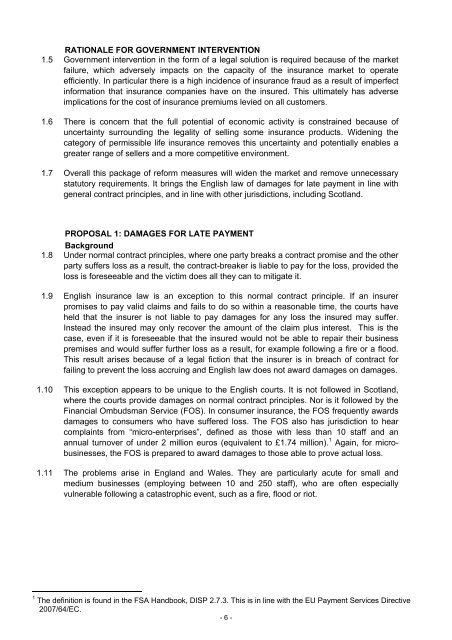Impact Assessment (IA) Summary: Intervention ... - Law Commission
Impact Assessment (IA) Summary: Intervention ... - Law Commission
Impact Assessment (IA) Summary: Intervention ... - Law Commission
You also want an ePaper? Increase the reach of your titles
YUMPU automatically turns print PDFs into web optimized ePapers that Google loves.
RATIONALE FOR GOVERNMENT INTERVENTION<br />
1.5 Government intervention in the form of a legal solution is required because of the market<br />
failure, which adversely impacts on the capacity of the insurance market to operate<br />
efficiently. In particular there is a high incidence of insurance fraud as a result of imperfect<br />
information that insurance companies have on the insured. This ultimately has adverse<br />
implications for the cost of insurance premiums levied on all customers.<br />
1.6 There is concern that the full potential of economic activity is constrained because of<br />
uncertainty surrounding the legality of selling some insurance products. Widening the<br />
category of permissible life insurance removes this uncertainty and potentially enables a<br />
greater range of sellers and a more competitive environment.<br />
1.7 Overall this package of reform measures will widen the market and remove unnecessary<br />
statutory requirements. It brings the English law of damages for late payment in line with<br />
general contract principles, and in line with other jurisdictions, including Scotland.<br />
PROPOSAL 1: DAMAGES FOR LATE PAYMENT<br />
Background<br />
1.8 Under normal contract principles, where one party breaks a contract promise and the other<br />
party suffers loss as a result, the contract-breaker is liable to pay for the loss, provided the<br />
loss is foreseeable and the victim does all they can to mitigate it.<br />
1.9 English insurance law is an exception to this normal contract principle. If an insurer<br />
promises to pay valid claims and fails to do so within a reasonable time, the courts have<br />
held that the insurer is not liable to pay damages for any loss the insured may suffer.<br />
Instead the insured may only recover the amount of the claim plus interest. This is the<br />
case, even if it is foreseeable that the insured would not be able to repair their business<br />
premises and would suffer further loss as a result, for example following a fire or a flood.<br />
This result arises because of a legal fiction that the insurer is in breach of contract for<br />
failing to prevent the loss accruing and English law does not award damages on damages.<br />
1.10 This exception appears to be unique to the English courts. It is not followed in Scotland,<br />
where the courts provide damages on normal contract principles. Nor is it followed by the<br />
Financial Ombudsman Service (FOS). In consumer insurance, the FOS frequently awards<br />
damages to consumers who have suffered loss. The FOS also has jurisdiction to hear<br />
complaints from “micro-enterprises”, defined as those with less than 10 staff and an<br />
annual turnover of under 2 million euros (equivalent to £1.74 million). 1 Again, for microbusinesses,<br />
the FOS is prepared to award damages to those able to prove actual loss.<br />
1.11 The problems arise in England and Wales. They are particularly acute for small and<br />
medium businesses (employing between 10 and 250 staff), who are often especially<br />
vulnerable following a catastrophic event, such as a fire, flood or riot.<br />
1<br />
The definition is found in the FSA Handbook, DISP 2.7.3. This is in line with the EU Payment Services Directive<br />
2007/64/EC.<br />
- 6 -

















